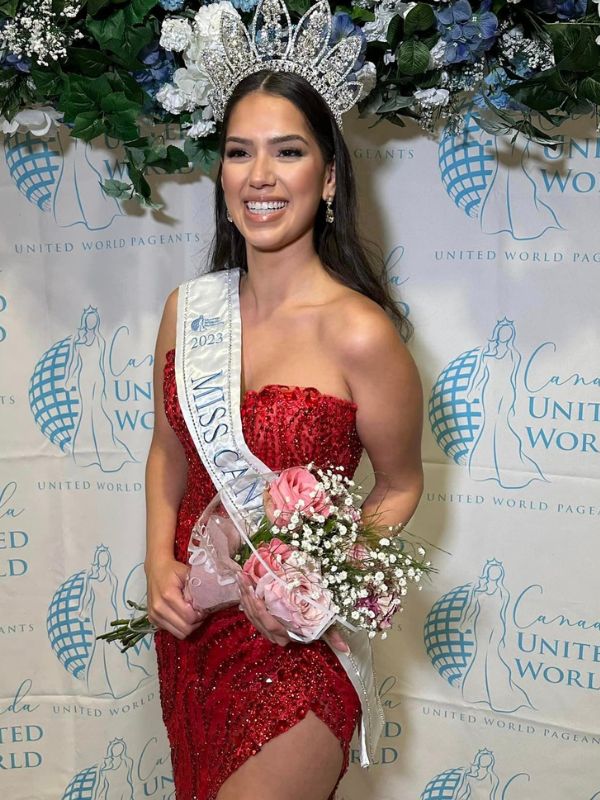
- Details
- By Kaili Berg
Magan Kateri Basque (Mi’kmaq) from the Eskasoni First Nation in Nova Scotia made history in May when she was crowned winner of the 2023 Miss Canada United World Pageant, the first Indigenous woman to claim the title in the pageant’s 66-year history.
Basque focuses on her commitment to the Indigenous women in Canada. During the Miss Canada United World pageant, she wore an elegant red sequin dress to represent Missing and Murdered Indigenous Women and Girls.
“Growing up, I never had someone to look up to who was into pageantry,” Basque told Native News Online. “That is someone who I really wanted to be and travel to the Indigenous communities here in Nova Scotia. I am just trying to be someone who I would have wanted to inspire when I was younger.”
Basque grew up in a single-mother household and is also a mother herself to her son Deluca. She says her son has inspired her in many ways to start her journey into pageantry.
“I really want him to have a positive role model for himself and inspire him to follow his dreams and know that anything is possible,” Basque said.
 Make A Donation Here
Make A Donation Here
Basque began her pageantry path in 2015 when she was mentored by Mrs. Universe, Ashley Callingbull (Cree), the first Canadian and Indigenous woman to receive the title.
“When I was a teenager, Ashley was a mentor at the Nova Scotia princess pageant,” Basque said. “She shared her story and her success and that was someone who I looked up to. That is why I started pageantry.”
In 2017, Basque won the title of Miss Cape Breton, and later that year participated in Miss Canada World but did not win the crown.
“I didn’t win that pageant, but things take time, hard work, and dedication,” Basque said. “With the title I have now it is nice to look back on everything. I just want to continue that cycle for other Indigenous youth to be inspired.”
Since receiving her title as Miss Canada United World, Basque has used her platform to help Indigenous women living in poverty. Forty-seven percent of women living on reserves are in poverty, according to the Women’s Legal Education and Action Fund.
This year, Basque created an initiative called Culture for a Cause, which helps give back to the Native Women’s Association of Canada by creating traditional beaded earrings and donating the proceeds.
Challenges arise for Baque, even though her title as Miss Canada United World is a huge accomplishment for Indian Country. Basque says that she receives a lot of racism on social media platforms.
“There is a lot of racism on platforms, but it does not bother me,” Basque said. “I know myself and I love myself. Things like that don’t bother me, and it can be one of the most difficult things I have faced. It’s sad to see the comments and negativity out there.”
Basque is getting ready to cross another milestone off her list of dreams as she prepares to walk the runway at the New York Fashion Week in February. She was given the opportunity by a fellow Miss United winner when she represented Canada at the United World Pageant in September.
“I always wanted to be a model. Being able to achieve things like this is really exciting for me. It happened so quickly and I am not sure what to expect, but I am so excited to have received the opportunity,” Basque said.
More Stories Like This
Zuni Youth Enrichment Project Takes Top Emerging Artist Apprentices to Phoenix for Artistic Exploration and Cultural ImmersionFrom Dishwasher to Award-Winning Chef: Laguna Pueblo's Josh Aragon Serves Up Albuquerque's Best Green Chile Stew
Rob Reiner's Final Work as Producer Appears to Address MMIP Crisis
Vision Maker Media Honors MacDonald Siblings With 2025 Frank Blythe Award
First Tribally Owned Gallery in Tulsa Debuts ‘Mvskokvlke: Road of Strength’
Help us defend tribal sovereignty.
At Native News Online, our mission is rooted in telling the stories that strengthen sovereignty and uplift Indigenous voices — not just at year’s end, but every single day.
Because of your generosity last year, we were able to keep our reporters on the ground in tribal communities, at national gatherings and in the halls of Congress — covering the issues that matter most to Indian Country: sovereignty, culture, education, health and economic opportunity.
That support sustained us through a tough year in 2025. Now, as we look to the year ahead, we need your help right now to ensure warrior journalism remains strong — reporting that defends tribal sovereignty, amplifies Native truth, and holds power accountable.
 The stakes couldn't be higher. Your support keeps Native voices heard, Native stories told and Native sovereignty defended.
The stakes couldn't be higher. Your support keeps Native voices heard, Native stories told and Native sovereignty defended.
Stand with Warrior Journalism today.
Levi Rickert (Potawatomi), Editor & Publisher

